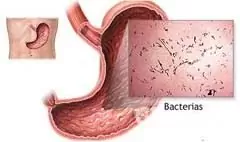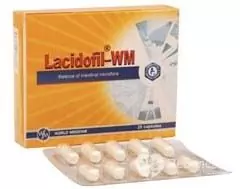- Author Rachel Wainwright [email protected].
- Public 2023-12-15 07:39.
- Last modified 2025-11-02 20:14.
Gastroenteritis
General characteristics of the disease

Gastroenteritis is an inflammation of the lining of the stomach and small intestine. In most cases, it is caused by rotavirus infection, transmitted by the oral, fecal, household, food or water route. In this case, the inflammatory process also affects the mucous membrane of the oropharynx.
When the large intestine is affected, the disease is called gastroenterocolitis. Depending on the severity of symptoms, it is customary to distinguish between acute gastroenteritis and its chronic form. In everyday life, the disease is often called stomach flu.
Mass cases of acute gastroenteritis were recorded in official medical documents at the end of the 19th century. Today, the disease still ranks second in prevalence in socially disadvantaged regions of the earth. In 1980, more than 4.6 million people died from acute gastroenteritis on the planet.
Thanks to modern standards for the treatment of acute gastroenteritis, the number of deaths today has been reduced by 3 times.
Causes of gastroenteritis
The causative agent of gastroenteritis is a rotavirus of the Reoviridae family. There are several types of this microorganism. Some of them cause inflammation of the lining of the stomach and small intestine in humans. Others are considered typical causative agents of acute gastroenteritis in animals and are not dangerous to humans.
In a quarter of cases, it is the acute gastroenteritis virus that causes the so-called traveler's disease - acute poisoning and intestinal upset.
Rotaviruses have good environmental survival. The causative agent of acute gastroenteritis is able to maintain its viability for up to 2 months in tap water with a temperature above 20˚, in vegetables - up to 1 month and in feces - up to 7 months.
The source of rotavirus infection is often humans. The most dangerous period is the first week of illness. The next 10-30 days, the contagiousness (the probability of infecting others with acute gastroenteritis) in the patient gradually decreases.
In rare cases, the human body can release viruses several months after the illness. He does not have specific symptoms of gastroenteritis.
Acute gastroenteritis in children
Asymptomatic carriers of the infection are detected, as a rule, among adults. In children, gastroenteritis, on the other hand, occurs in the most acute form.

Timely identification of such asymptomatic carriers of infection in schools, kindergartens and other institutions plays a huge role in the prevention of acute gastroenteritis in children. Children under 3 are most susceptible to viruses.
The mother herself often becomes the source of gastroenteritis infection in children under one year old. The risk group includes babies with congenital diseases, various forms of immunodeficiency, or children who are bottle-fed.
Post-infectious immunity of gastroenteritis is short-lived.
Symptoms of gastroenteritis
The disease begins acutely after an incubation period of 1-5 days. The earliest symptoms of gastroenteritis are nausea, vomiting, and diarrhea.
With a mild form of gastroenteritis, vomiting may be single. It stops during the first day. However, such a symptom of acute gastroenteritis as diarrhea manifests itself up to 5-7 days. Liquefied stool is observed up to 6 times a day.
Patients with symptoms of gastroenteritis also complain of a feeling of weakness, pain in the umbilical region, heaviness in the stomach, lack of appetite, and headache.
With a severe form of acute gastroenteritis, in children in particular, the stool is fetid, liquid, foamy, with mucus impurities up to 12-15 times a day.
Diagnostics of the gastroenteritis
During the examination of the patient, the doctor pays attention to the following clinical symptoms of gastroenteritis:
- muscle weakness of the patient,
- pronounced noise of intestinal peristalsis,
- swelling of the pharynx,
- white coating on the tongue
- muffled heart tones
- subfebrile temperature indicators (37.1-37.3˚).
In severe forms of acute gastroenteritis, fever and severe dehydration are possible, up to circulatory failure and anuria (cessation of urine production).
A typical symptom of rotavirus gastroenteritis is the course of the disease against the background of complications of the respiratory tract: the development of pharyngitis, rhinitis, or a mixed form of the disease.
Laboratory methods for the diagnosis of gastroenteritis include the isolation of viruses in the feces of a patient using RLA, RCA, RSC, ELISA techniques, gel immunoprecipitation or immunofluorescence.
Gastroenteritis treatment
There is no effective etiotropic treatment for gastroenteritis. This means that modern medicine does not know how to influence the cause of the disease.
First aid measures for early symptoms of gastroenteritis include:
- abstinence from food for 1-2 days,
- drinking enough fluids
- easily digestible diet after an acute period of illness,
- quitting nicotine,
- bed rest.

In acute gastroenteritis in young children, breastfeeding is recommended to continue.
Medicinal methods for treating gastroenteritis include polyenzyme drugs: Abamin, Polysim, Pancreatin, Festal, etc., as well as adsorbents and drugs with an astringent effect.
To correct the water-electrolyte balance in the treatment of severe gastroenteritis, intravenous drip administration of rehydrants is used. Oral administration of plasma-substituting and detoxifying solutions (Regidron, Refortnan, etc.) is used for acute mild and moderate gastroenteritis.
YouTube video related to the article:
The information is generalized and provided for informational purposes only. At the first sign of illness, see your doctor. Self-medication is hazardous to health!






